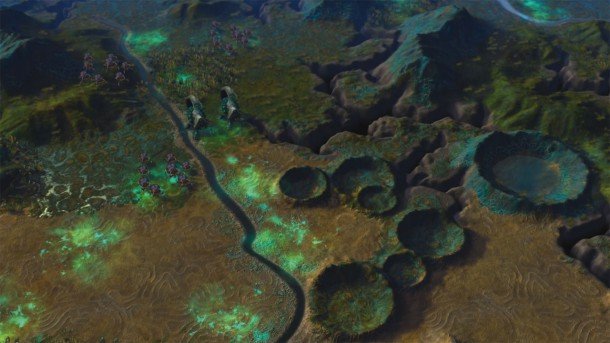Civilization: Beyond Earth interview - everything you need to know about the new factions, aliens, technology and more

PC Gamer: Where did you draw inspiration from for the planet itself?
David McDonough: We're big fans of the sweep of the sci fi canon. There's no shortage of strange and incredible worlds out there, from Dune to the Buggers from Ender's Game. There's no new ideas about alien planets out there, there's just fun good ones. It's an interesting balance of making the planet recognisable to the human eye so you can tell what's good, where do I want to live on this planet, and maknig it alien, so it's totally bizarre. A lot of the new things like the canyons, the Miasma, the new resources and so on are ways to do that at the same time. We cleared the decks and rebuilt the very idea of map generation. We have these biomes with whole-world palettes with unique plantlife and unique colour schemes and unique layouts and so on, so when you go to one it feels like a different world each time. Earth version B,C and D, it's like you went to a whole different part of the galaxy where planets are different.
PC Gamer: Will the monsters be different from from world to world?
David McDonough: The actual units will be the same. Their behaviour will be different, because they take advantage - the AI reacts to the terrain it has, so a Vulcan planet, which is all land and a lot of canyons, will probably have a lot more worm activity. The problem you have to solve regarding the alien life will be different than if you were on a nautical planet with a lot of the sea creatures that we have. It was more a constraint of keeping the learning curve down to keep the player from having to relearn the game every time they start a different planet.
PC Gamer: What technological extremes can you explore on the tech web?
Will Miller: That's where the reading list came in. The first thing we did was go on Wikipedia to the Alpha Centauri webpage, and it has the books that Brian Reynolds and his team read, so we read those, and that was our starting point. And we read a lot more, and got a survey of all the weird things we could do and the weird places we could go, and the tech web really reflects that. They cater to each of those affinities as we mentioned, but there's always this thread of plausibility through the whole thing. It was important to us not to start high sci-fi, but to gradually get there through a route that seems very plausible to the player. I don't remember the exact Karl Sagan quote, but he says humans of the future will be quite different from us, fewer of our weaknesses, more of our strengths. We wantes to show this evolution all the way through, and have it be plausible.
PC Gamer: I saw transhumanism as one of the paths, how else can humanity progress?
Keep up to date with the most important stories and the best deals, as picked by the PC Gamer team.
David McDonough: The web represents the frontiers of science. Your culture can embrace any part of it on the way to where it's going. You can say that the strong arms are, off to the left there's alteration to the human form, so cybernetics, human augmentation, surrogacy, putting your brain in a can, that kind of stuff, that's where transhunanism shows up. Near it is artificial intelligence, super advanced computing, artificial sentience, robotics, machine life and so on. Then there's information and communication sciences, so lots of orbital stuff, data collection storage and analysis. Imagine a world run by the unholy alliance of Twitter and Wikipedia.
PC Gamer: Oh god.
David McDonough: Another analogy would be the Hitchhiker's Guide, data flows freely and the Purity player will find lots there, like human archivism and holding onto what came from Earth. Next to that is planetary sciences starting with alien fauna and alien geology and then moving onto terraforming, all the way to the point of planetary engineering where you can dig into the mantle and mine rare ores right out of the lava. Or you can build machines that shake the very ground under your enemies and stuff like that.
Above it is genetics, starting with what the human genome is and what the genome is we find on the alien world, and then extrapolating, blending them, hybridising, breeding new life, reverting humanity to an earlier genome stripped of all its flaws, like the promethean idea of the ultimate idea of human, and then in between body modification and genetics are the xeno-sciences, about the alien world you find, things that are unique about the Miasma, the alien ecosystem, the bizarre resources you find and what that means for new technologies. You'll get some combination of those, maybe about 75%, and you can decide which one's the most important to you. Whatever you want to do, those techs are how you do it. They're the engine of the game.
PC Gamer: How do victory conditions work in Beyond Earth?
Will Miller: They're quite different. We decided early on that we wanted victory in the game to be something you start a little bit earlier, and a bit of a gamble. This is it, you're taking your shot, you're making your run and be very dramatic, so the victories are couched in our quest system. So you get these four victory quests at the beginning of the game and it tells you step by step what you would need to do them, and they're reach tailored to one of the affinities, and then there's one that anybody can do. This is the contact victory, you get a signal through some means, either by researching it and finding it in a transcendental number, the ?mentissa?, or finding it in an alien ruin, or getting it in space when you put a radio telescope up there, and then you build a beacon, and then you have to turn it on and protect it while it's on, then several turns later the aliens, the progenitors, turn up and then you win.
There's the transcendence victory, this is the Harmony victory, this is a nod to Alpha Centauri of course. In this victory you discover that the planet is a living being, like Solaris almost, a living thing, and find a way to communicate with it, and integrate yourselves into its consciousness.
Then there are the promised land and emancipation victories, and these are my two favourite. You reestablish contact with Earth. You leave Earth in a very ambiguous state. They're on the mend, but resources are running low, and you're not really sure, so you re-establish communication with Earth and then you build a warpgate and if you're the Supremacy player and go for the emancipation victory, you send military units through the warpgate to conquer - to emancipate earth, to bring it in line with you. If you're the Purity player you bring settlers through and settle them, so that's a cool victory to go for because you have to plant these settlers and protect them until you have enough to sustain a new human colony.
PC Gamer: So once you've built the warpgate, there's more play after that?
Will Miller: That's where the gamble starts. You build the warpgate, which is a planetary wonder, which is a new concept in the game. It's a wonder that takes up an entire hex, and you have to give up that hex as part of your city to build this thing, and it takes a while and a lot of resources to build, and then if you're sending things through it or taking things out of it you have to protect it, they're very weak, so there's a military presence that has to be there, and there's a certain number of units you have to send in, and a certain number of units you have to pull out, and it it's the same with all of the other ones. It's not just "I build this thing and I win," it's "I build this thing, and you turn it on, you have to protect it and all the other players know you're gunning for it. It's a neat twist on winning Civ.
PC Gamer: It sounds less abstract than previous victory conditions in Civ when you'd just research the technology at the end of the tree, and you don't quite know where everyone's at.
David McDonough: The way we designed them philosophically is that, it's a little easier in historic Civ to point to what makes a civilization great, because we already know. In the future, you're all going in these different directions and you have these different affinities, and what is the end point? Well there really isn't one, it's just the beginning of one, right? So we pointed to the victory conditions and said this is going to represent humanity taking the next leap, leaping into a new epoch where they've met another sentient alien race, or they've achieved a transcendent level of consciousness because they've discovered this other level of lifeform, so the victory conditions are all funnelled around that, and they're exclusive, right? If you want to wake up the planet, the guy who's trying to settle Earthlings on it probably isn't, they're not going to be harmonious, so you put humanity to another turning point, and it's either going to be the one you want, and you win, or the one that your opponents want, and you have to stop them.
Part of the UK team, Tom was with PC Gamer at the very beginning of the website's launch—first as a news writer, and then as online editor until his departure in 2020. His specialties are strategy games, action RPGs, hack ‘n slash games, digital card games… basically anything that he can fit on a hard drive. His final boss form is Deckard Cain.


